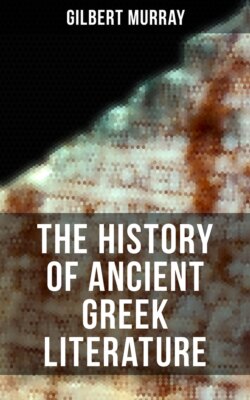Читать книгу The History of Ancient Greek Literature - Gilbert Murray - Страница 15
На сайте Литреса книга снята с продажи.
COMIC POEMS
ОглавлениеOf the Comic Poems which passed in antiquity as Homer's, the only extant example is the Battle of the Frogs and Mice,rather a good parody of the fighting epic. The opening is Bœotian; the general colour of the poem Attic. An obvious fable -- followed strangely enough by A. Ludwich in his large edition -- gives it to one Pigres, a Carian chief, who fought in the Persian War. The battle began because a mouse named Psicharpax, flying from a weasel, came to a pond to quench his thirst. He was accosted by a frog of royal race, Physignathos, son of Peleus -- (the hero of Mount Pelion has become 'Mudman,' and his son 'Puff-cheek'!) -- who persuaded him to have a ride on his back and see his kingdom. Unhappily a 'Hydros' -- usually a watersnake, here perhaps some otter-like animal -- lifted its head above the water, and the frog instinctively dived. The mouse perished, but not unavenged. A kinsman saw him from the bank, and from the blood-feud arose a great war, in which the mice had the best of it. At last Athena besought Zeus to prevent the annihilation of the frogs. He tried first thunderbolts and then crabs, which latter were more than the mice could stand; they turned, and the war ended.
There were many comic battle-pieces; we hear of a Spider-fight,* a Crane-fight,* a Fieldfare-poem.* Some were in iambics, and consequently foreign to the Homeric style. The most celebrated comic poem was the Margîtes,* so called after its hero, a roaring blade (μαργος), high-spirited and incompetent, whose characteristic is given in the immortal line --
πóλλ' ήπíστατο ἐργù, κακως δ ἠπíστατο πáντα.
"Many arts he knew, and he knew them all badly;and again: "He was not meant by the gods for a digger or a ploughman, nor generally for anything sensible; he was deficient in all manner of wisdom." Late writers on metre say the poem was in a mixture of heroic and iambic verse, a statement which suggests a late metrical refurbishment of a traditional subject. It can scarcely be true of the poem which Aristotle regarded as Homer's. Margîtes must have been more amusing than Hierocle's 'Scholasticus,' the hero of the joke-book from which so many of our 'Joe Millers' are taken. Scholasticus was a pure fool, with nothing but a certain modesty to recommend him.
What is meant by calling these poems Homeric? Only that they date from a time when it was not thought worth while to record the author's name; and, perhaps, that if you mean to recite a mock epic battle, it slightly improves your joke to introduce it as the work of the immortal Homer.
